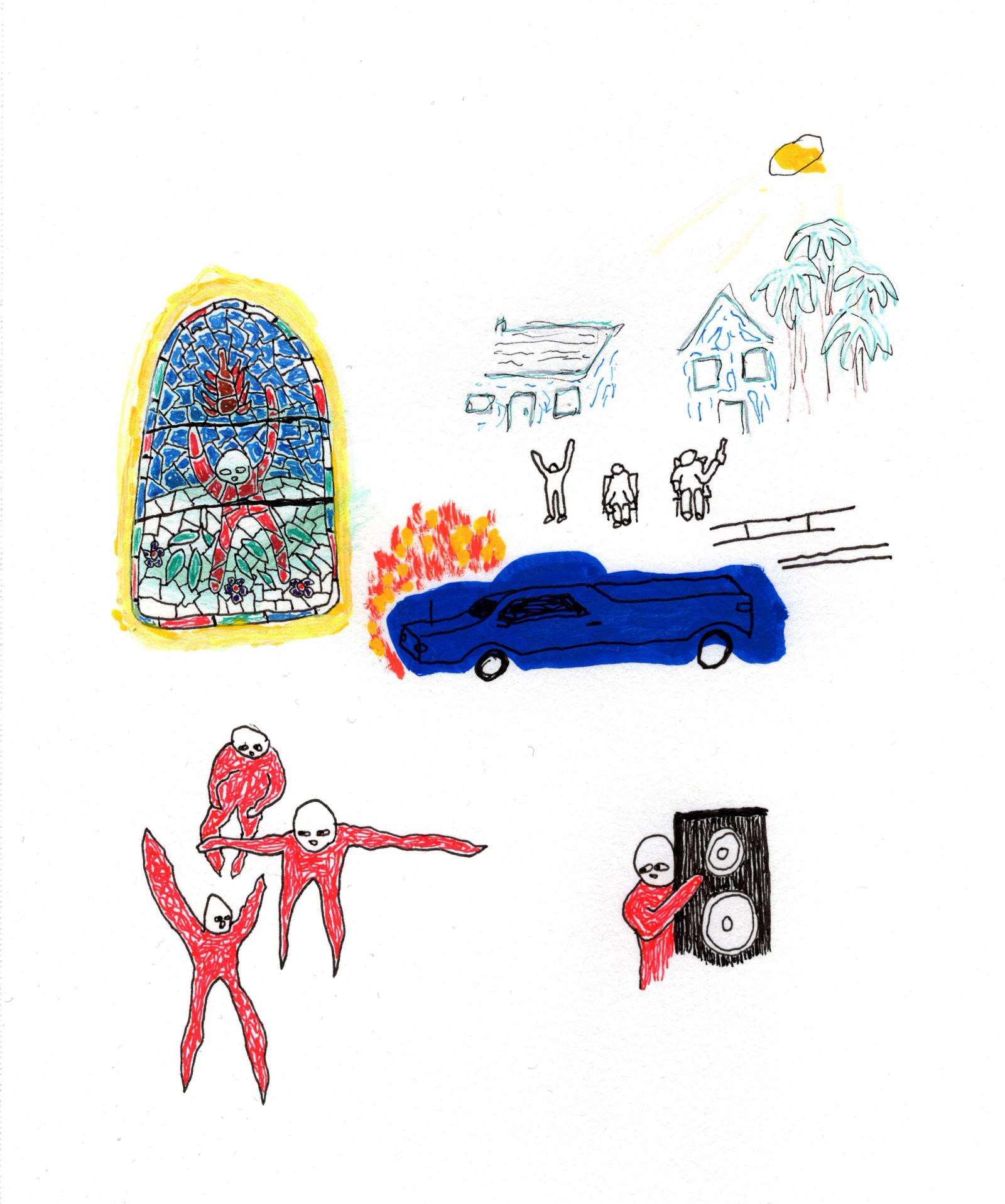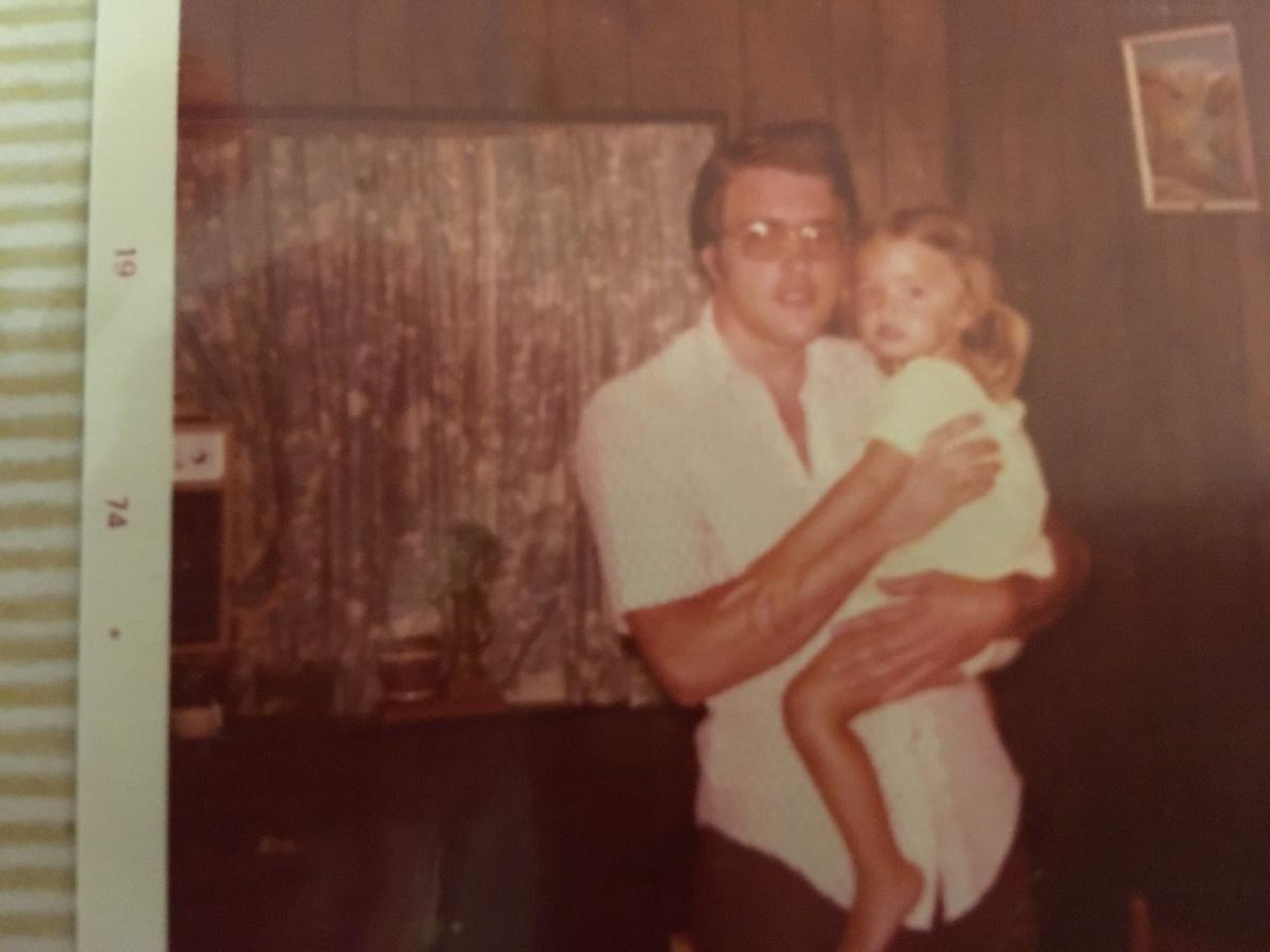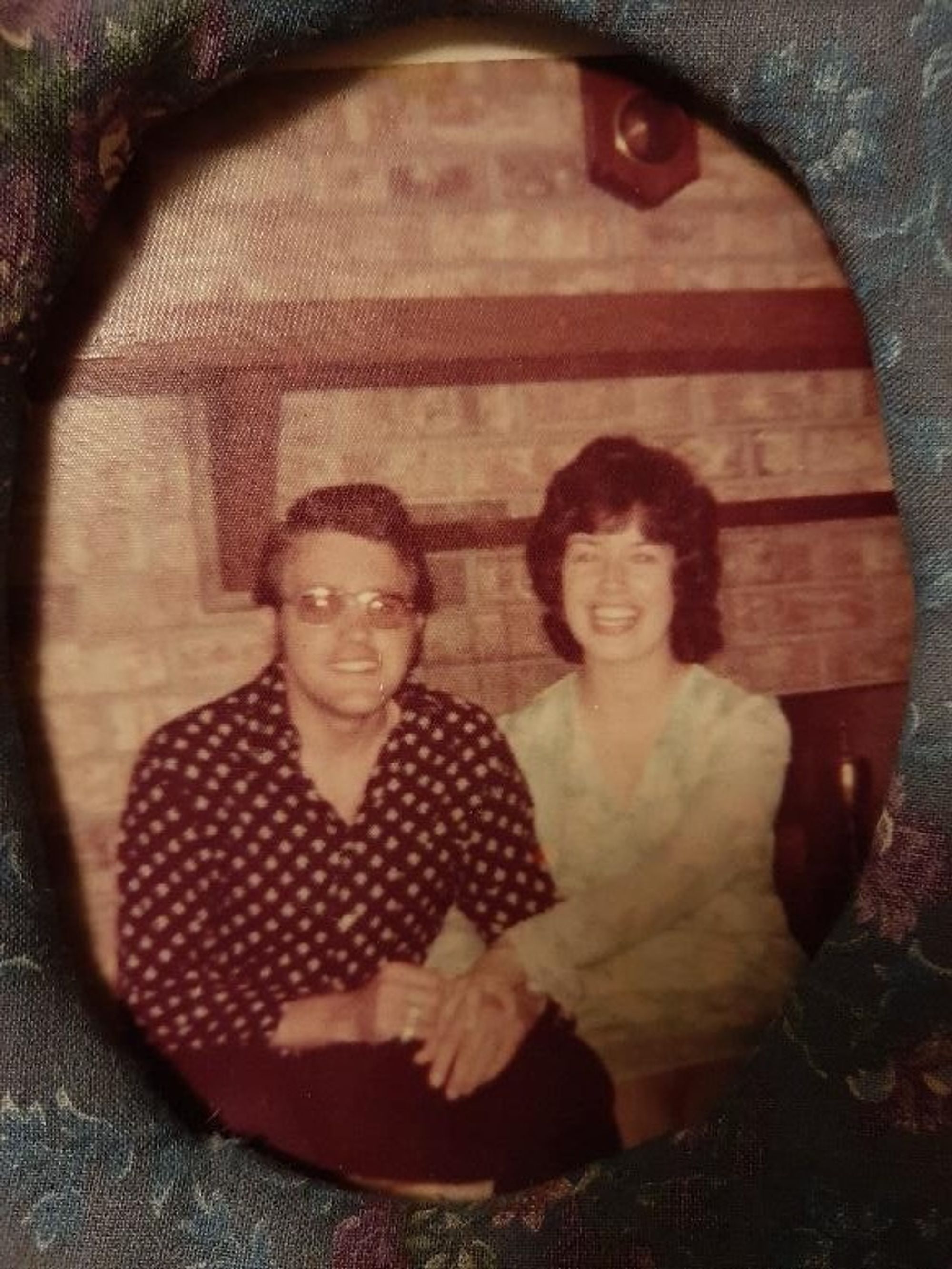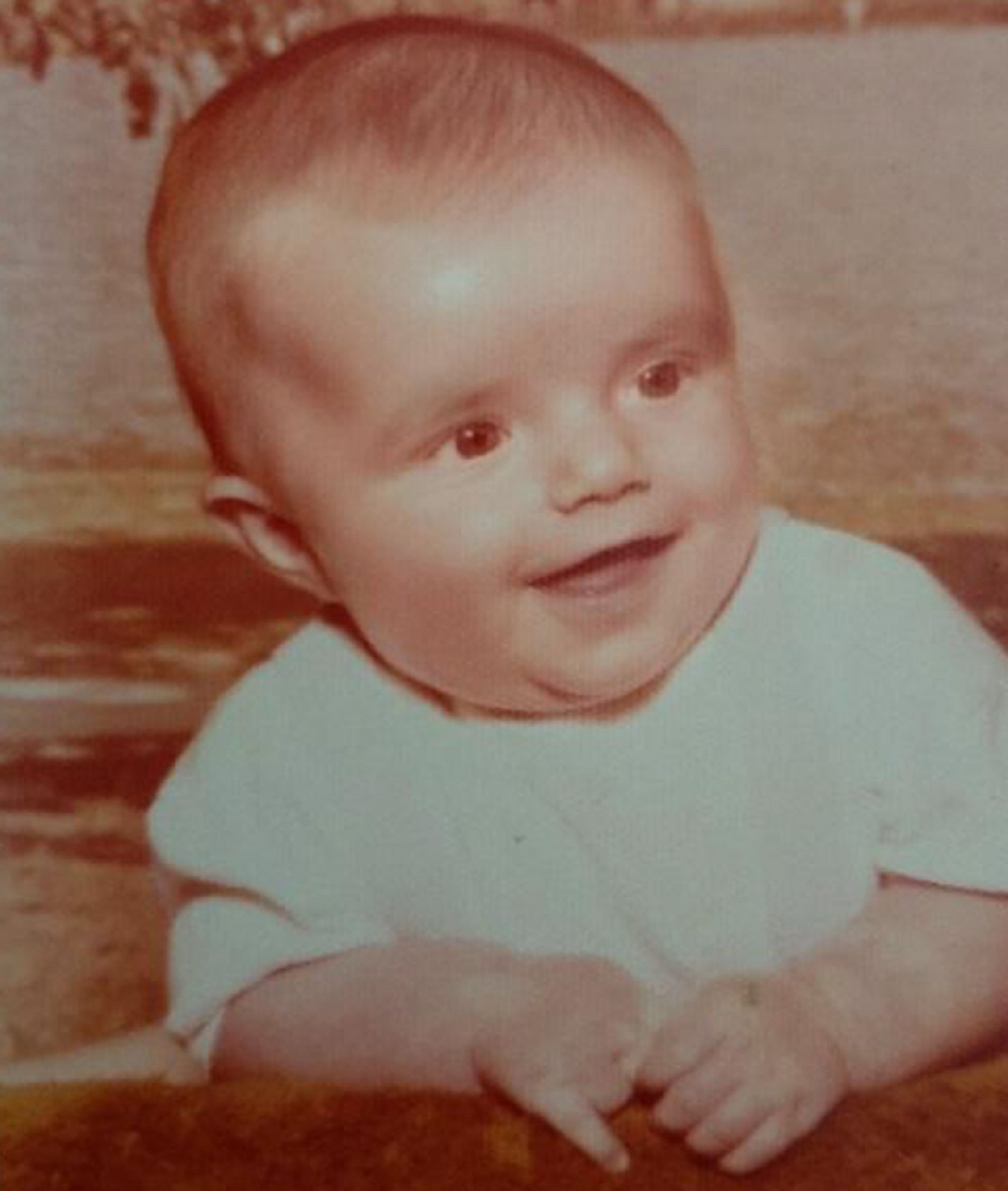
Portrait of the Artist as a Young Porpoise

The next week Karen moved into Mrs. Berry’s trailer. Mrs. Berry was the school cook at Danese Elementary, where Karen taught.
One evening, after school, Mrs. Berry told Karen to get ready, and Karen thought, “Oh god, I don’t want to go to another funeral.”
She’d taught children all day and didn’t feel like going to Rainelle again. But Karen put on a new white dress and waited for Mrs. Berry.
It seemed like this was all they ever did. Go to funerals.
Karen got in Mrs. Berry’s car and asked if she could stay home to do her lesson plans, but Mrs. Berry said no.
Mrs. Berry put the car into drive and whispered, “You know how people talk, Karen. A young woman being left alone next door to my husband.”
Karen couldn’t believe it. Mr. Berry was in his 70s by this point and the kindest of men. Karen said she wanted to stay, but Mrs. Berry wouldn’t listen—a man was a man. So Karen had to go to the funeral because Mrs. Berry was afraid she’d steal her husband.
Mrs. Berry said, “Besides, Karen, there’s somebody in Rainelle I want you to meet.”
Who?
An hour later, they got to Wallace and Wallace funeral home and went inside. Karen felt uncomfortable in the same room with a stranger’s dead body. It didn’t bother Mrs. Berry, though. She wrote obituaries for the Meadow River Post for three cents a word. And if you were to open the paper on Thursdays, you would find a normal-sized obituary and then a Dorothy Berry-penned obituary that covered an entire page. This way, Mrs. Berry got paid more. Karen sat next to a crying old woman and a dead body in the casket. She listened to Mrs. Berry ask the family questions about the dead.
Where was she born and how did she die? Was she ever married, and did she suffer long?
Then Mrs. Berry wrote down the answers. But then Mrs. Berry stopped and saw food in the back. For if there was one thing Mrs. Berry loved more than getting paid to go to funerals, it was free food.
Karen finally got up and walked over to Mrs. Berry who said, “Look Karen! It’s an angel food cake.”
Karen watched Mrs. Berry take a plastic fork and cut a fat slice. She didn’t even take a paper plate but ate the spongy cake with her fingers. There were old women in the front who were crying.
They listened to Mrs. Berry groan, “Oh god,” and, “This cake is SOOO good.” And, “Oh Karen, get yourself a piece.”
Karen said no and watched more people give Mrs. Berry dirty looks. Karen moved away, but Mrs. Berry didn’t care. She cut another slice and kept stuffing her face.
Karen told Mrs. Berry they shouldn’t be eating. Somebody brought this food for the family.
A tiny woman overheard them and said, “That’s right. Somebody brought this food for the family.”
Mrs. Berry froze with a chunk of angel food cake in her mouth.
The tiny woman stared off and said, “People who didn’t even know her, making hogs of themselves.”
Mrs. Berry chewed the last piece of cake and swallowed.
She picked up her purse and said, “Come on, Karen. Let’s go.”
But on the way out, Mrs. Berry complained. “What does that little bitty know about anything? I’m the one who is writing that woman’s obituary.”
They got into the car, and Mrs. Berry continued, “I’m the one who knows her most of all. I’m the one who is telling her story.”
That evening, they drove back home across the Loops Road. Karen still didn’t know who Mrs. Berry wanted her to meet. The road was twisty-turny and made you lose your stomach. It was the kind of road where children begged their fathers to drive fast so they could feel their stomach fall. But then Karen and Mrs. Berry passed a cobbled together house where Mrs. Berry said a poor family lived.
They had a crippled brother, but they all took care of him.
They were all workers, but they had depression problems.
It was a family called the McClanahans.
_______________________________________________________________
The next morning, Karen didn’t even think about it. She got up and drove Mrs. Berry to Rainelle to do the grocery shopping. They drove across the Loops Road and down Sewell Mountain. They pulled into the Kroger parking lot and found a spot.
Mrs. Berry said, “Well, I hope he’s working today. The man I want you to meet.”
Then they walked into the store and started their shopping. Karen picked up the sales paper to see inside.
Mrs. Berry turned towards the produce and squealed, “He’s here, Karen.”
And there he was.
Karen saw him. He was wearing his apron folded across his stomach.
He had slicked back hair and sideburns and glasses. He was putting out potatoes.
Karen thought he looked like Elvis.

Mrs. Berry and Karen walked over, and Mrs. Berry told the man that this was Karen. She was the new teacher at Danese Elementary.
The man waved hello and said his name was Gary.
Mrs. Berry walked away and said, “Well, there he is Karen. That’s the one.”
Karen felt embarrassed, but the man just laughed because he’d known this old woman, Mrs. Berry, all his life. He knew how she was.
He asked Karen what grade she taught, and she said, “First.”
The man laughed, “They sure didn’t have teachers who looked like you when I went to school.”
Karen smiled and said she was living in one of Mrs. Berry’s trailers. The man told her he rode his motorcycle out that way sometimes.
Karen said he should stop and see her the next time he did. The man smiled, and Karen smiled too. Then he went back to work. For if you were to write a book about Gary Mack’s life, it would have only one sentence: he was always working. But a few nights later, the man stopped. His motorcycle engine popped in front of the trailer, and the young man got off his bike. Karen invited him inside, but he hesitated at the steps because he was wearing muddy motorcycle boots. She told him it was fine, and he struggled to pull them off. Karen thought this was so thoughtful. He didn’t want to track in any mud. And this is how it started. Muddy motorcycle boots.
This is how they met.

They were married in 1975.
_______________________________________________________________
Mrs. Berry got older, and Mom and Dad saw her less. One day, thirty years later, I was married and living in Beckley. Sarah, my first wife, came home from her job as a nurse in the ICU. She told me there was an elderly patient from Danese who was dying. She asked me if I knew her.
She said, “Her name is Dorothy Berry.”
I told her I did. I said, “She's the reason I exist.”
Three days later, Dorothy Berry died, and we all laughed when her obituary was published. It was so long we swore she must have written it herself. And Sarah was the last face she saw on this earth. They were both strangers, but Sarah’s children existed because Dorothy Berry existed too, and we were all connected somehow.
A pattern.
NOW A BIRTH
Karen thought she was going to die when she got pregnant. The doctor told her she had high blood pressure, and he was concerned about a condition called pre-eclampsia, where the blood pressure spikes and the mother strokes out and dies. The baby dies too. In June 1978, the doctor put Karen in the hospital so he could monitor her pregnancy. Karen touched her giant stomach and wondered if she’d ever see her feet again.
She patted her pregnant belly and said, “Don’t worry, baby, it’ll be alright.”
This is what she had said all winter to her unborn child when she drove over Route 20. On those winter mornings, on her way to school, she was the first one to break the path. The car slipped and slid in the snow, and she said, “We’ll be okay, little baby. Don’t worry.”
The unborn baby kicked and thought, “I don’t know, lady. This seems slick as shit.”
But they’d made it through the winter. In the hospital, Gary sat beside the bed while Karen thought of baby names. Robert or Allen. But she didn’t want a boy.
Her husband said, “What about Scott? Then his middle name can be Wayne.”
Karen said she wanted a girl.
Then she talked about all the girls’ names she could give her baby, “Nicole and Rebecca and... “
Gary Mack said, “Sounds like you’re wanting a girl.”
Karen laughed and thought about what her girl would look like one day. She saw her gorgeous daughter all grown. She was dressed in pink and standing outside. She looked like this:

Karen watched her husband sitting next to her bed. He’d just bought the continental house in Rainelle for 18,000 dollars, and Karen was here in the hospital because the doctor was worried. But then the phone rang, and they both jumped. Gary Mack picked it up and said hello. It was his manager from Kroger. Gary Mack had no idea how his manager found him. Old Man Thompson asked where he was, and Gary Mack said his wife was having a baby.
Thompson said, “Well, are you having a baby?”
Gary Mack said no, and Thompson said, “Well, if you’re not having a baby, then you need to get your ass back to work.”
Gary Mack left and drove all the way to Rainelle.
He was always working.
Now Karen was alone and nervous. That evening, the doctor came in and took her blood pressure, and it was high. He decided to induce her and during delivery put her under anesthetic so the blood pressure wouldn’t spike. Karen sat in bed and nodded, optimistic. For if a nuclear bomb blew up, Karen could still smile and say, “Well, look at that. What a pretty mushroom cloud.” Because even in death, she could see the beauty. Now the doctor took the needle and injected the inducement dose. He told her to get some rest. He finally left, and Karen tried to read the Ladies’ Home Journal, but she couldn’t get comfortable. She shifted her weight in bed, and the nurse turned out the light. She couldn’t go to sleep because she was in pain now.
She pushed the call button, but no one came. She remembered it was the weekend, and they were short-staffed. She waited for her labor pains to pass and thought about Mrs. Berry’s daughter-in-law, Lita, who was from the Philippines. A few weeks before, they’d gone to Murphy’s together so Lita could buy a monkey, and West Virginia was the kind of place, where, in 1978, you could still buy a wild monkey at a store. Karen groaned in terror and thought about how Lita didn’t like West Virginia. When Lita was a little girl living in the Philippines, that’s where all the ghosts lived.
In the mountains.
Karen’s labor pains passed, and she felt scared and saw a light. She saw the face of Jesus and the face of Judas too. She saw the two faces become one face and heard a voice say, “God is summer and winter, and immortals are mortals, mortals-immortals, living inside their death, and dying inside their life.”
Then she felt something wet between her legs, and she realized her water had broken. She tried calling the nurse again, but no one came.
She thought she was going to die.
But then she saw her Grandma Dory standing at her bedside. She put a warm washcloth on Karen’s face. She saw all the faces of the ones who had come before, at the start of the world when we were one. She saw the man with the lightning bolt tattoo who whispered a warning, “Time is a hungry animal, and we are the food of time.” Then she saw her Uncle James who was just a little boy. He came and held her hand. He told her not to worry and it would all be okay, and her baby would be born special. She saw there was no such thing as an “I.” We carry a thousand deaths inside of us, alive. All the people from this book, and all the people from her life, gathered around her bed and waited. And you were there too, the one who is reading this.
And so this was my mother on the night of my birth.
She moaned in pain through the night, and all this past was inside her pregnant stomach. Later, she wondered if her hallucinations were from the hormones, or if this was the first sign of her own mania and depression.
The doctor came the next morning and told her it was time. She didn’t tell him about her hallucinations. Then the anesthesiologist said she would be asleep soon. He asked mom to count backwards 99, 98 and that was the last thing she remembered. The doctor pulled the baby from between her legs and the child cried groggy, but the mother was still asleep. The nurse wrote down the time of birth as 8:07 and recorded the baby’s weight as 8 pounds, 6 ounces. The baby screamed for its mother all alone. The loneliness had begun. The nurses wiped the blood and gunk from his pink skin. But her baby was alive. The mother was alive too.
She named her son Scott McClanahan.
My name.
_______________________________________________________________
So you wake up groggy a few minutes later. You see a thick haze in your hospital room and hear voices trying to wake you. Your husband comes in, and you ask if it’s a boy or a girl. He tells you it was a boy, but your eyelids feel so droopy you forget. You ask again, and he says it was a boy. You hurt between your legs and have hemorrhoids now. You try to think, but there’s velvet on your brain.
You realize you can’t remember, so you say, “Did I have a boy or a girl?”
Gary laughs and repeats, “You had a baby boy, Karen.”
But then a half hour later, they bring him to you. You hold him soft against your chest. He still seems groggy from your anesthesia. You touch his tiny fingertips and smell his baby skin. He looks so clean he glows. Your husband reaches out and grabs the baby arm.
He says, “Look at that big old head. That head is so big he looks like a porpoise baby.”
You get mad and shout, “My BABY DOES NOT look like a porpoise.”
You shout, “Why would you even say that?”
Your husband says sorry, but your porpoise baby is here.

So you are my mother now, reader, and I am your son, and you hold me tight inside this story. The nurse teaches you how to feed, and you pull down your gown and push your breast to my lips. I reach with my wet mouth and hold my hungry gums against the skin. I knead the veiny flesh with tiny hands like a kitten. And so, I suck. I suck down all your stories of the dead and fill my stomach full of past. My lips latch tight, and I join the mystery. Then you nuzzle my head with your nose.
You kiss my head and whisper, “I love you, Scott Wayne. Do you hear me? I’m your mother, and I’ll always love you.”
Now you hold me in your arms, and 42 years later I give birth to myself inside of a book.
For the narrator of our story has finally arrived. Time is speeding up, but for right now it’s Saturday, June 24, 1978, and it’s 8:30 in the morning.
And “I”…
I am just a few moments old.
Scott McClanahan
Scott McClanahan is the writer of Crapalachia, The Sarah Book, and The Collected Works of Scott McClanahan Vol. 1. He lives in West Virginia.
Matthew Reed
Matthew Reed is a multi-disciplinary artist from Asheville North Carolina. Find more of his work at tvbeaches.com.
